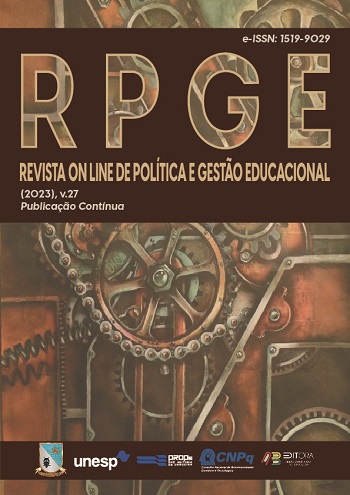Las humanidades en una universidad técnica
De la transferencia de conocimientos a la formación de un espacio educativo y humanitario
DOI:
https://doi.org/10.22633/rpge.v27i00.18060Palabras clave:
Humanidades, Motivación, Educación, Formación de la personalidadResumen
Hoy en día, los especialistas deben estar alerta en entornos multiculturales, capaces de realizar y desarrollar su potencial creativo y aprender constantemente nuevas habilidades. Recientemente, la excesiva especialización en la educación ha llevado a una disminución del tiempo dedicado a la enseñanza de materias del ciclo social y humanitario. El artículo analiza la motivación de los estudiantes de especialidades técnicas para estudiar humanidades y la transformación de esta motivación en diversos cursos. Para ello, se realizó un estudio empírico basado en el Instituto Politécnico de Moscú. La muestra de investigación consistió en estudiantes del Instituto Politécnico de Moscú que estudian en dos facultades: tecnología química y tecnología de la información. Teniendo en cuenta los resultados, los educadores de humanidades no solo deben impartir conocimientos, sino también establecer estándares humanitarios y culturales que fomenten el diálogo, no el monólogo, la tolerancia, realizar un análisis histórico y ético de una situación y desarrollar soluciones efectivas que no entren en conflicto con principios humanistas.
Descargas
Citas
BALGANOVA, E. Digitalization trends and risks professional education. Russian Journal of Education and Psychology, v. 12, n. 3, p. 19-31, 2021. DOI: 10.12731/2658-4034-2021-12-3-19-31.
BEZGODOV, D. N.; VOLOGIN, E. A.; SHILOVA, S. V. Philosophy as a basic discipline for technical areas of undergraduate and specialist studies. Higher education in Russia, v. 27, n. 3, p. 135-143, 2018.
BORODINA, T.; SIBGATULLINA, A.; GIZATULLINA, A. Developing creative thinking in future teachers as a topical issue of higher education. Journal of Social Studies Education Research, v. 10, n. 4, p. 226-245, 2019.
DONOHUE, D. Culture, cognition, and college: How do cultural values and theories of intelligence predict students’ intrinsic value for learning? Journal of Culture and Values in Education, v. 4, n. 1, 2020. DOI: 10.46303/jcve.2020.3.
GUSEVA, E. A.; PANFILOVA, M. I. On the discussion of university philosophy: what, how, why. Higher education in Russia, v. 28, n. 2, p. 69-78, 2019. DOI: 10.31992/0869-3617-2019-28-2-69-78.
HONEGGER, M. What Does “Education” Mean: Cultural Values in Educational Language. Journal of Culture and Values in Education, v. 3, n. 2, p. 42-53, 2020. DOI: 10.46303/jcve.2020.12.
ISAIKINA, M.; NEDOGREEVA, N.; POKOTILO, A. Role of metasubject educational results in learners’ professional self-consciousness formation. Russian Journal of Education and Psychology, v. 12, n. 3, p. 7-18, 2021. DOI: 10.12731/2658-4034-2021-12-3-7-18.
IVAKHNENKO, E. N.; KUZNETSOVA, N. I. On the benefits of rational simplicity: how to teach the humanities in technical universities? Higher education in Russia. n. 4, 2022. Available: https://cyberleninka.ru/article/n/o-polze-ratsionalnoy-prostoty-kak-prepodavat-gumanitarnye-distsipliny-v-tehnicheskih-vuzah. Access: 12 Dec. 2022.
IVYGINA, A.; PUPYSHEVA, E.; MUKHAMETSHINA, D. Formation of sociocultural competence among foreign students. Journal of Social Studies Education Research, v. 10, n. 4, p. 288-314, 2019.
KAYUMOVA, G. et al. Developing creative potential of a schoolchild by means of native language. Journal of Social Studies Education Research, v. 10, n. 1, p. 81-92, 2019.
KEEFER, N.; HAJ-BROUSSARD, M. Language in Educational Contexts. Journal of Culture and Values in Education, v. 3, n. 2, p. 1-12, 2020. DOI: 10.46303/jcve.2020.9.
KORABLEVA, O. N.; MITYAKOVA, V. N.; KALIMULLINA, O. V. Designing a decision support system for predicting innovation activity. Paper presented at the ICEIS 2020 - Proceedings of the 22nd International Conference on Enterprise Information Systems, v. 1, p. 619-625, 2020.
KOROTKEVICH E. R. Educational motivation of a modern student in the context of the theory of achieving goals. Educational resources and technologies, v. 3, n. 28, 2019. Available: https://cyberleninka.ru/article/n/uchebnaya-motivatsiya-sovremennogo-studenta-v-kontekste-teorii-dostizheniya-tseley. Access: 12 Dec. 2022.
KOSACHEVA, V. O. Motivation of students for learning and professional development. MNCO, v. 5, n. 96, p. 56-79, 2022. Available: https://cyberleninka.ru/article/n/motivatsiya-studentov-k-obucheniyu-i-professionalnomu-razvitiyu. Access: 12 Dec. 2022.
KUZNETSOVA, N. I. Unobtrusive pedagogy. Science as a public good: Sat. articles. Nauch. ed. and comp. L.V. Shipovalova, I.T. Karsavin: In 7 vols. M.: ROIFN, v. 7, n. 6, p. 88–91, 2020. Available: http://rshps.ru/books/congress2020t6.pdf. Access: 12 Dec. 2022.
LOBANOVA, Yu. V.; BAZHENOVA, N. V. Ethics of dialogue in modern education. Modern Science: Actual Problems of Theory and Practice. Series: Cognition, v. 5, n. 80, p. 129-131, 2018.
MEDVEDEVA, G.; MITINA, G. Professional development of higher education institutions pedagogical workers in the context of the federal project «New Opportunities for Everyone». Russian Journal of Education and Psychology, v. 12, n. 3, p. 32-47, 2021. DOI: 10.12731/2658-4034-2021-12-3-32-47.
MILOVANOVA, G. V.; KULYASHOVA, N. M.; SHEMYAKINA, E. Yu. Comparative analysis of motivational characteristics of students at different stages of education. Concep, v. 6, p. 122-143, 2022.
OTTS, E. V.; PANOVA, E. P.; LOBANOVA, Yu. V. A study of the long-term effectiveness of training in a pandemic. 2021
POGOSYAN, V. Institutional Reconstruction: Complete Alteration? In: Economic and Social Development ESD-2017 (Book of Proceedings). 25th International Scientific Conference on Economic and Social Development / 17th International Social Congress (Moscow, Russia, Oct. 30-31, 2017). Varazdin, Croatia: Varazdin Development and Entrepreneurship Agency, 2017. p. 931-936.
POGOSYAN, V. Updating social theory: Redefinition of modernization. Wisdom, v. 19, n. 3, p. 182-193, 2021. DOI: 10.24234/wisdom.v19i3.486.
SAENKO, N. et al. Understanding in the context of distance learning. In: TOROPOVA, E. V. (Eds.). Man, Society, Communication. European Transactions in the Social and Behavioral Sciences, 2021. DOI: 10.15405/epsbs.2021.05.02.98. v. 108, p. 772-778.
Descargas
Publicado
Cómo citar
Número
Sección
Licencia
Derechos de autor 2023 Revista on line de Política e Gestão Educacional

Esta obra está bajo una licencia internacional Creative Commons Atribución-NoComercial-CompartirIgual 4.0.
Manuscritos aceitos e publicados são de propriedade da Revista on line de Política e Gestão Educacional. É vedada a submissão integral ou parcial do manuscrito a qualquer outro periódico. A responsabilidade do conteúdo dos artigos é exclusiva dos autores. É vedada a tradução para outro idioma sem a autorização escrita do Editor ouvida a Comissão Editorial Científica.










